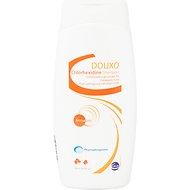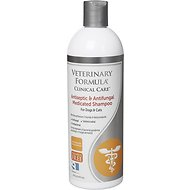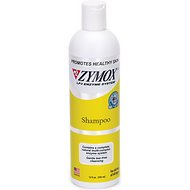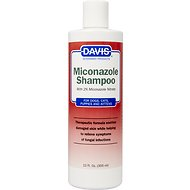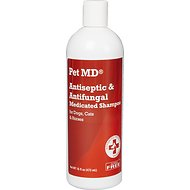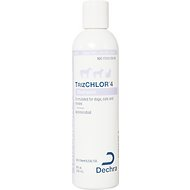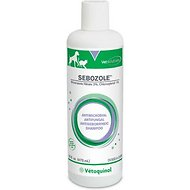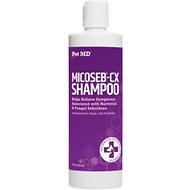Contents
- What Is The Best Cat Food For Ringworm?
- What is Ringworm?
- Tips for Treating Ringworm in Cats
- The 9 Best Cat Shampoos for Ringworm
- Duoxo Chlorhexidine PS Dog & Cat Shampoo
- Veterinary Formula Clinical Care Antiseptic & Antifungal Shampoo
- Zymox Veterinary Strength Enzymatic Dog & Cat Shampoo
- MiconaHex+Triz Shampoo for Dogs & Cats
- Davis Miconazole Dog & Cat Shampoo
- PetMD Antiseptic & Antifungal Medicated Shampoo
- TrizCHLOR4 Shampoo for Dogs & Cats
- Vetoquinol Vet Solutions Sebozole Shampoo
- PetMD Micoseb-CX Antifungal Medicated Pet Shampoo
- Frequently Asked Questions
When you first bring home a new kitten, you find yourself going to the vet every couple of weeks for different vaccinations. In addition to having your kitten vaccinated, you’re probably going to need to have him de-wormed – especially if you adopted him from a shelter. Worms are one of the least pleasant things you’ll find yourself facing as a cat owner, but they may be less common than you might imagine. What’s more common is a condition that has “worm” in the name but nothing to do with actual worms – ringworm.
Ringworm is a common skin condition in cats and, though serious, it is entirely treatable. In this article, we’ll explore the subject of ringworm in cats to learn where it comes from, what kills ringworm in cats, and how medicated shampoo should be part of your cat’s treatment plan.
What Is The Best Cat Food For Ringworm?
- Duoxo Chlorhexidine PS Dog & Cat Shampoo
- Veterinary Formula Clinical Care Antiseptic & Antifungal
- Zymox Veterinary Strength Enzymatic Dog & Cat
- MiconaHex+Triz Shampoo for Dogs & Cats
- Davis Miconazole Dog & Cat Shampoo
- PetMD Antiseptic & Antifungal Medicated
- TrizCHLOR4 Shampoo for Dogs & Cats
- Vetoquinol Vet Solutions Sebozole Shampoo
- PetMD Micoseb-CX Antifungal Medicated Pet
What is Ringworm?
Though the name might bring to mind pictures of slimy legless creatures, ringworm doesn’t actually have anything to do with worms. It’s a common fungal infection that forms in the superficial layers of skin. The name comes from the ring-like appearance of rash characteristic to the disease.
The organisms responsible for ringworm are a specialized group of fungi called dermatophytes. This is why ringworm in cats is also known as feline dermatophytosis. Some dermatophytes are species-specific, though many are infectious to cats as well as dogs and humans. Microsporum canis, the species responsible for almost all ringworm infections, is also infectious to humans.
Because your cat’s body is covered in a layer of fur, it can be difficult to detect skin conditions like ringworm. The fungi responsible for ringworm feed on the keratin found in the outer layers of the skin, hair, and nails. Ash-like scaling is often the only visible indicator of ringworm infection in cats, though some develop thickened patches of skin paired with hair loss. These lesions typically form on the chest, head, legs, or back and they don’t tend to itch.
Tips for Treating Ringworm in Cats
Ringworm is very contagious and can be transmitted through direct contact with the fungus. This means your cat can get it through contact with an infected animal or person or through touching a contaminated surface. Ringworm spores can live on surfaces like cat brushes, food bowls, and furniture for as long as 18 months.
After exposure to ringworm fungus, the disease incubates for 7 to 14 days before lesions appear. Diagnosis of ringworm in cats may involve the use of a special UV lamp called a Wood’s lamp or through a fungal culture taken from hair and skin scrapings. Without treatment, ringworm may resolve in 3 to 5 months, but treatment is recommended to limit the spread.
Here are some tips for treating ringworm in cats:
- Apply medicated ointment or cream to the skin affected by the ringworm – you may need to trim or shave the hair in this area to reach the skin.
- Bathe the cat twice weekly with a medicated shampoo for ringworm – this is particularly recommended for longhair cats because treatment with topical applications can be tricky.
- Consider administering an oral anti-fungal drug like griseofulvin for at least 6 weeks – it’s important to complete the course of treatment or the infection may recur.
- Thoroughly clean your household including pet toys, brushes, and bedding to eliminate fungal spores – you can use a diluted bleach solution.
The 9 Best Cat Shampoos for Ringworm
Though ringworm will eventually resolve itself, it isn’t something you want to ignore. This condition is highly contagious and it can spread over your cat’s body and to other pets – you could even get it yourself. Talk to your veterinarian about anti-fungal medications and topical ointments or consider using medicated ringworm shampoo to get the infection under control and start healing your cat’s skin.
Here are our top picks for the best ringworm shampoo for cats:
| Our 2024 Picks: Best Cat Shampoo for Ringworm | |||
Duoxo Chlorhexidine PS Dog & Cat Shampoo
|
CHECK PRICE | ||
Veterinary Formula Clinical Care
|
CHECK PRICE | ||
Zymox Veterinary Strength Enzymatic
|
CHECK PRICE | ||
MiconaHex+Triz Shampoo for Dogs & Cats
|
CHECK PRICE | ||
Davis Miconazole Dog & Cat Shampoo
|
CHECK PRICE | ||
PetMD Antiseptic & Antifungal Medicated
|
CHECK PRICE | ||
TrizCHLOR4 Shampoo for Dogs & Cats
|
CHECK PRICE | ||
Vetoquinol Vet Solutions Sebozole Shampoo
|
CHECK PRICE | ||
PetMD Micoseb-CX Antifungal
|
CHECK PRICE | ||
Duoxo Chlorhexidine PS Dog & Cat Shampoo
When dealing with ringworm in cats, you want a shampoo that will help address the fungal infection as well as the skin-related symptoms. Duoxo Chlorhexidine PS Dog & Cat Shampoo features a powerful combination of chlorhexidine and climbazole which kill bacteria and fungi as well as lipacid which helps restore the skin’s natural protective barrier. This shampoo moisturizes the skin to protect against irritation and itching, plus it contains phytosphingosine which offers anti-inflammatory benefits.
Pros: Improved management of skin conditions, relieves inflammation and itching
Cons: May not lather as well as some shampoos, contains some artificial fragrance
Veterinary Formula Clinical Care Antiseptic & Antifungal Shampoo
For a medicated shampoo that does more than just soothe itchy skin, consider this Veterinary Formula Clinical Care Antiseptic & Antifungal Shampoo. This formula contains benzethonium chloride to eliminate bacteria as well as ketoconazole to treat fungal infections like ringworm. The first of these ingredients helps control odor and reduces your cat’s risk for developing secondary bacterial infections. This shampoo contains aloe vera to soothe the skin and speed the healing process and it is completely free from parabens and sulfates.
Pros: Deodorizes coat and controls fungal infections, aloe vera soothes skin and speeds healing
Cons: Contains artificial color and fragrance, not recommended for kittens under 12 weeks
Zymox Veterinary Strength Enzymatic Dog & Cat Shampoo
Severe itching leads to excessive scratching which can damage your cat’s skin and open it up to secondary infections. This Zymox Veterinary Strength Enzymatic Dog & Cat Shampoo is a unique formula that helps soothe irritated skin while protecting against infectious microbes. This shampoo contains mild plant-based surfactants along with the patented LP3 Enzyme System which cleanses while comforting the skin. Perfect for managing fungal infections like ringworm, this shampoo is safe and gentle but delivers fast, natural relief from inflammation, irritation, and itching.
Pros: Creates natural barrier against infectious microbes, soothes and hydrates irritated skin
Cons: Some users found the fragrance too strong
MiconaHex+Triz Shampoo for Dogs & Cats
If you’re simply looking for a medicated shampoo designed to tackle fungal infections like ringworm, consider this MiconaHex+Triz Shampoo for Dogs & Cats. This formula offers antimicrobial as well as antifungal benefits and it contains ceramides which help moisturize, repair, and restore your cat’s dry and damaged skin. This recipe is specifically formulated for ringworms, dandruff, and yeast infections as well as secondary bacterial skin infections. It is made in the USA and safe for use up to 4 times per week.
Pros: Formulated to fight fungal infections, contains ceramides to moisturize and repair skin
Cons: May not lather as well as some shampoos
Davis Miconazole Dog & Cat Shampoo
A therapeutic formula designed to soothe damage skin while relieving symptoms of fungal infections, this Davis Miconazole Dog & Cat Shampoo is a great option in ringworm shampoo for cats. This formula contains 2% miconazole nitrate with 2% colloidal oatmeal, making it the ideal solution for dermatological conditions in your cat. In addition to providing soothing relief from dry, itchy, and irritated skin, this formula contains rich emollients which penetrate deep into the coat, locking in essential moisture to keep those symptoms from coming back. It doesn’t contain artificial fragrances or dyes and it is safe for use up to twice weekly.
Pros: Formulated for dermatological conditions like ringworm, soothes and moisturizes damaged skin
Cons: May require repeated applications, may not lather as well as some shampoos
PetMD Antiseptic & Antifungal Medicated Shampoo
To give your cat’s coat a deep clean, consider this PetMD Antiseptic & Antifungal Medicated Shampoo. This formula is skin-friendly, designed to cleanse and deodorize the coat while resolving fungal and bacterial skin infections. This shampoo features a soap-free formula that is free from parabens to avoid further skin irritation. It contains active ingredients chlorhexidine and ketoconazole to eliminate skin problems at the source and it helps astringe the affected skin to speed healing.
Pros: Eliminates fungal infections at the source, cleans and deodorizes skin and coat
Cons: Contains some artificial fragrance, may not lather as much as some shampoos
TrizCHLOR4 Shampoo for Dogs & Cats
If you’re looking for a powerful medicated shampoo that works against even stubborn fungal infections, consider this TrizCHLOR4 Shampoo for Dogs & Cats. This shampoo is designed to kill bacteria, fungus, and viruses – even multi-drug resistant Staphylococcal infections. In addition to its powerful active ingredients, this shampoo also contains betaine to soothe the skin and it doesn’t contain alcohol that might dry it out or add to the irritation. This is one of the most powerful medicated shampoos on the market you can purchase without a veterinarian’s prescription.
Pros: Powerful active ingredients, betaine soothes the skin, alcohol-free water-based formula
Cons: May require repeated applications, contains some artificial fragrance
Vetoquinol Vet Solutions Sebozole Shampoo
Ringworm infections can be stubborn and the skin-related symptoms can become severe. This Vetoquinol Vet Solutions Sebozole Shampoo is a great option in cat shampoo for ringworm because it contains two powerful active ingredients: miconazole nitrate and chloroxylenol. These ingredients offer antibacterial, antifungal, and anti-seborrheic benefits to relieve symptoms of a wide variety of seborrheic skin conditions. This formula is gentle enough for routine use up to twice weekly and it is easy to use. Simply wet the coat and lather it up then let it soak for 10 minutes before rinsing it away.
Pros: Two powerful active ingredients, relieves symptoms of seborrheic skin conditions
Cons: Contains some artificial fragrance and color, some users found the scent too strong
PetMD Micoseb-CX Antifungal Medicated Pet Shampoo
This PetMD Micoseb-CX Antifungal Medicated Pet Shampoo contains two powerful active ingredients designed specifically to fight fungal and bacterial skin infections: miconazole nitrate and chlorhexidine gluconate. In addition to relieving fungal infections like ringworm, this formula also soothes dry and irritated skin thanks to the addition of aloe vera. Ceramides help support the skin’s natural protective barrier and this formula is pH-balanced for your cat’s skin, so it won’t exacerbate irritation.
Pros: Formulated to fight fungal and bacterial infections, soothes dry and irritated skin
Cons: May require repeated applications
Frequently Asked Questions
- How do cats get ringworm? Ringworm is a fungal infection spread through direct contact with an infected host or contaminated surfaces. Your cat could contract ringworm through direct contact with another infected cat or from another animal. He could come into contact with the fungal spores by touching a contaminated surface like a cat bed, food bowl, or shared pet brush.
- How do you know if your cat has ringworm? In many cases, ringworm is mild and difficult to detect but there are some signs to look for. The most obvious sign is the classic ring-like lesion that forms on the skin. These lesions usually appear on the legs, ears, and head but can be found anywhere on the body in severe infections. The lesion may begin with a patch of hair loss that progresses to redness and inflammation – some cats find the lesions very itchy. In more mild cases of ringworm, you may only notice an ash-like dusting in your cat’s coat – like dandruff.
- Can you get ringworm from a cat? Once your cat is infected with ringworm, he will remain contagious for about 3 weeks with aggressive treatment. Without treatment, your cat could spread the disease for much longer. Whether the condition can be spread to humans depends on the microorganisms themselves, but the most common type of ringworm is caused by Microsporum canis which can be spread to dogs and people.
- What kills ringworm in cats? The most effective cat ringworm treatment is an oral anti-fungal mediation. Topical ointments and creams can help soothe inflammation and heal the skin, as can bathing with ringworm shampoo for cats. The key to killing ringworm is to complete the entire course of treatment – this condition is very contagious and will come back if you don’t treat it aggressively. When it comes to a ringworm home remedy, you won’t find one as effective as oral anti-fungals. If you want to avoid traditional treatments, the infection will usually resolve itself within a few months.
Though ringworm is highly contagious, it is also both treatable and preventable. Keeping your cat indoors and maintaining a sanitary living environment are two key steps in keeping your cat protected. If you do notice signs of ringworm, talk to your veterinarian immediately to start a course of treatment. In the meantime, consider some of the medicated ringworm shampoo for cat options reviewed above.


